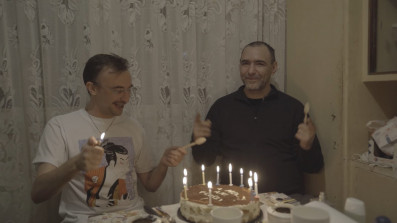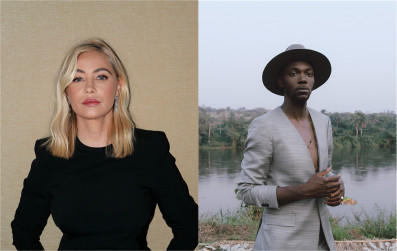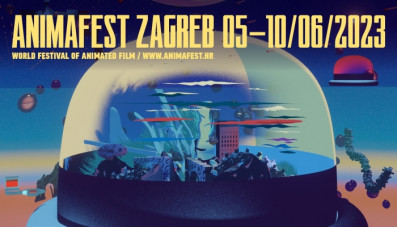Berlinale&EFM highlights: Several films to look forward to in upcoming months
After the five days of 71st edition of Berlinale/EFM it is time to sum up the list of films we can't wait for to hit the theatres
There is simply something wrong with the online format of film festivals and this year 71st edition of Berlinale has finally proved to us all that this is the case. Sure, we might have been enjoying, at first the comfort of home, no lines in front of theatres, no people being late and extremely loud at screenings and many more issues, but it has been a year since the pandemic started and is the first of the big three film festivals that are having its screenings online. Cannes slapped a logo on a bunch of films and never showed them last year, Venice did a true VIP thing where they limited the audience for the onsight event as much as possible, and sure Berlinale will have a physical edition later this year (09.-20.06.21) but these online press&EFM screenings that happened in the regular festival dates showed how much we need cinemas back in our lives.
There is something utterly wrong, so wrong it feels cheap, in watching the latest films of great authors of today in just a few clicks on a computer/ tv/ home projector. There is something even more wrong and snobbish/ elitist in watching the films that were meant to be shown to audiences, at the same time as to film industry representatives, but in the end, are shown only to those who are part of the industry.
For this reason, this year we will wait with our Berlinale festival film reviews until summer when these films will become available to common folk, cinephiles and film lovers from all around the world. Until then, the most we will be here to offer is the shortlist of five EFM titles (EFM and not Berlinale, because we watched some splendid films at Market, that were not part of the official festival programme) that we truly enjoyed and can't wait for them to hit the theatres.
One for the Road
"Boss, an elusive bar owner living in New York, reunites with his estranged best friend, Aood, for a road trip in Thailand after Aood has been diagnosed with terminal cancer." says the synopsis of the film One for the Road, directed by Baz Poonpiriya and produced by the +Wong Kar-Wai. To anyone who has seen at least one film about terminal cancer, this whole thing might sound like yet another story full of cliches, unneeded and undeserved sentiment as well as cheap melancholic sounds. Well, this is not one of those films!
One for the Road is a truly masterful joyride through the lives of two friends, previously mentioned Boss - played by Thanapob Leeratanakajorn, and Aood - starring Ice Natara. As we are taking the ride across Thailand with the duo, graceful rock and jazz hits are playing in the background, stories of past lovers, troubles and passions get unveiled and terminal cancer, well accept the shaved head of Aood is almost nowhere to be seen. The closest thing to compare this film to, without spoiling any details would be a road trip version of High Fidelity (2000) with the elements of Cocktail (1988).
Just a Movement / The Inheritance
71st edition of Berlinale surprised everyone with two films that directly referenced and discussed Jean Luc Godard's critical film essay masterpiece La Chinoise (1967), within contemporary society. The first one, Just A Movement by Belgian artist Vincent Meessen, is relocating the roles from Godard's film into modern-day Dakar, gives them to ordinary people and tells us the story of postcolonialism as well as the story of Omar Blondin Diop the only Maoist in the original film. Meessen manages to deliver a film that truly embraces the concept Jean Luc was only fooling around within his "artistry" and that concept is: "It is necessary to confront vague ideas with clear images".
The second film, and actually the one worth way more attention and praise for its original twists and plays on the concepts of La Chinoise,is The Inheritance by Ephraim Asili. It would be an understatement to say that director Asili takes the aesthetical and narrative ideas from Godard, he is rather inspired by the most known face of French New Wave, and he builds upon his inspiration to tell quite one of a kind story, of a young man who inherits the house from his grandmother and decides to an African-American socialist collective where community forms the basis of the family. Asili's messages are sharp and strong, his colour pallet choices, musical choices build upon the already great and important story and most importantly his characters don't represent the theoretical background of the societal ideas but rather are the true face of a society that has a potential to flourish under right circumstances.
The Most Beautiful Boy in the World
Luchino Visconti, one of the founding fathers of Italian neorealism, was preparing to adapt Death in Venice (1971), in the late '60s / the early '70s. The most important part of the film, for Visconti, was to find a perfect looking boy to play Tadzio in his film. His search and castings happened all around Europe for quite some time, until he found Björn Andrésen, who he later dubbed "the most beautiful boy in the world". Five decades after Death in Venice, Kristian Petri and Kristina Lindström are bringing us the documentary story of Andrésen, his rather complicated youth and toxic/ shattered family relations, his days of working with Visconti, as well what followed after his rise to fame.
Petri and Lindström, within their film, manage to bring a truly human and emotional story of a long-forgotten sensation/ acting star. To see now old Andrésen, put right to the images of his younger self is by itself already beautiful enough, but the directorial duo manages to place so much content, imagery and meaning to it that it is truly a stunning story to watch as it unfolds.
Bad Luck Banging or Loony Porn
Radu Jude, the splendid Romanian filmmaking mastermind came this year to Berlinale with his latest porn/essay/fiction film that captures the spirit of the society he is living in, and well, probably could also be translated to any of the current cheap sensationalist societal mentalities.
In the opening minutes, the film shows us Emi starring Katia Pascariu, a private and elite school teacher, at her primal, most common and humanly normal behaviour. She is having sex with her partner. A little bit of roleplay, blowjob, a bit of sadism/masochism, penetration, the usual stuff. The only issue is, the duo is filming their intercourse and the next thing we know, it has leaked on the internet.
From that point on, Jude is shifting the perspectives and approaches to the film with the goal to showcase to us all the issues hypocritical society has with sex and sexuality and the pain stakes that one might go through just for being a bit open-minded (intentionally or accidentally). Overall Jude yet again made a splendid, praiseworthy film that deserved and got the Golden Bear.
Petite Maman
Two years after the great success of Portrait of a Lady on Fire, Celine Sciamma is back with Petite Maman, a film so different from anything she has previously done that it would probably be impossible to connect it with the director if her name didn't show up in credits.
This time around Sciamma brings us a story of Nelly- starring Joséphine Sanz, a young girl that has just lost her grandmother. Her mother Marion - played by Nina Meurisse, is deeply grieving, and Nelly is there for her. As the family, after the funeral is moving to the forest to the cabin once owned by grandma, a young girl starts living her fairytale life. It all starts when in the forest she meets a girl, that looks a lot like her and lives in the same cabin as her, only accessed a different way. The girl's name is Marion - played by Nina's twin Gabrielle Sanz, and she lives with her mother, which Nelly notices is the younger version of her grandma.
In only 73 minutes film manages to tell a poetic fairytale of grief, understanding, family and the roles of family members through generations. Shot during the pandemic, with limited sets and autumn exteriors, Petite Maman proves yet again that Celine Sciama is a unique 21st-century film author.














